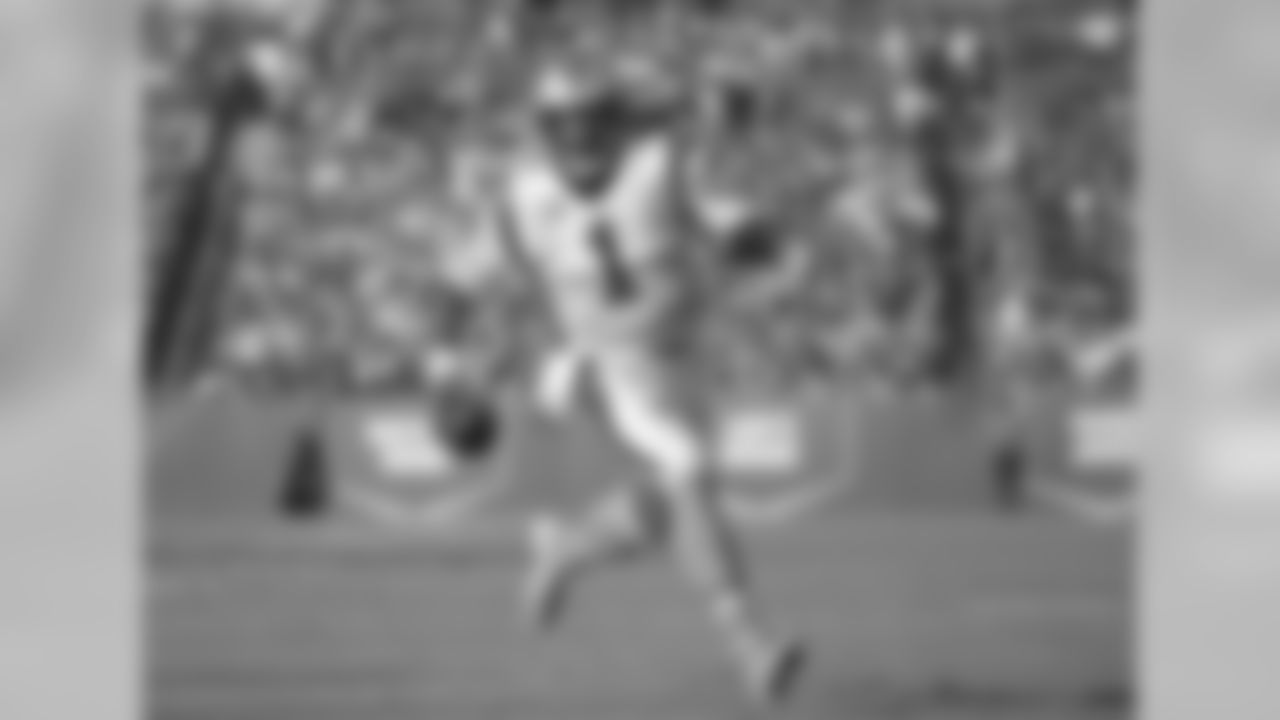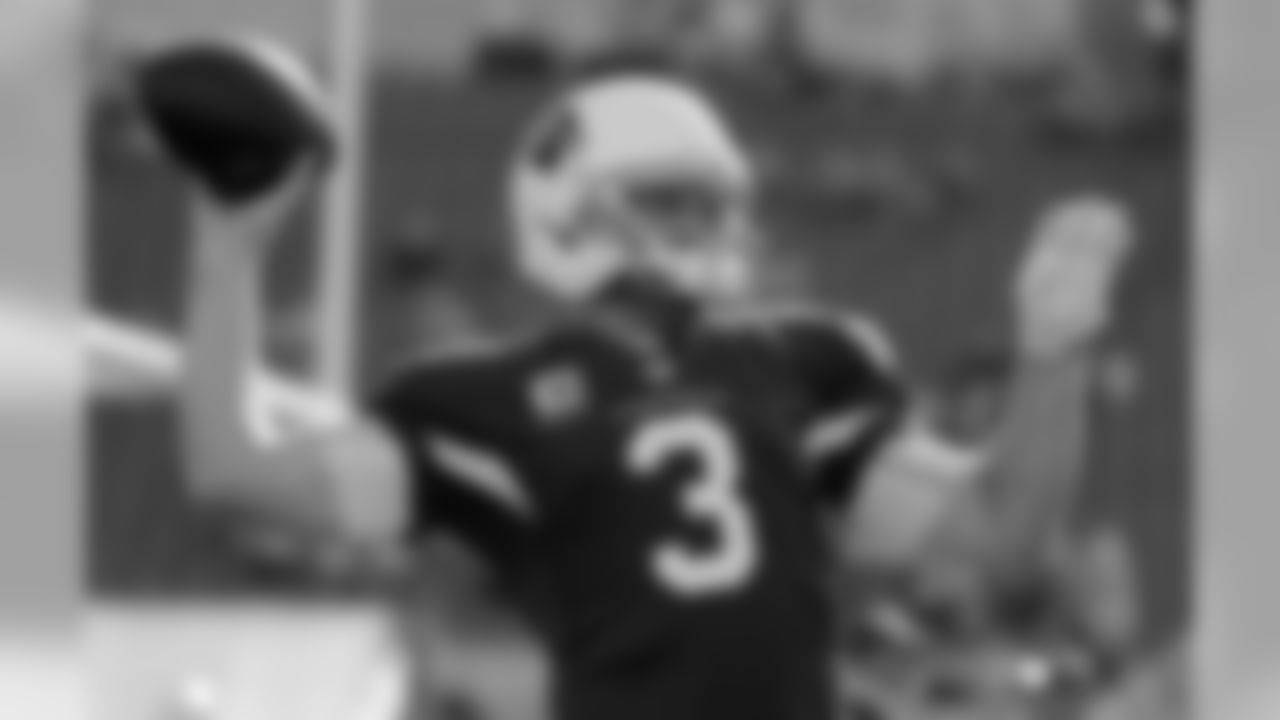Pictures of the Buccaneers opponents for the 2017 season.

Falcons (home and away)

Saints (home and away)

Panthers (home and away)

Bears (home)

Lions (home)

Patriots (home)

Giants (home)

Jets (home)

Cardinals (away)

Bills (away)

Packers (away)

Dolphins (away)

Vikings (away)
The news out of the NFL's Annual Meeting in Phoenix this week has mostly been dominated by the approval of the Oakland Raiders' move to Las Vegas. As always, however, the meeting was used as an opportunity to discuss and either adopt or reject a long list of proposed changes to the league's rules and procedures.
On Tuesday afternoon, the NFL revealed this year's list of adopted proposals, eight regarding playing rules, three regarding bylaws and one regarding a resolution. Here are a few thoughts on the rule changes for 2017.
Proposal: Prohibits the "leaper" block attempt on field goal and extra point plays.
This was the only adopted proposal that was introduced by a team rather than the Competition Committee, as the Philadelphia Eagles suggested this change. Exactly how the rule will be written and what the penalty would be if the play is attempted hasn't yet been announced.
I believe this may be the most divisive of all the rules changes, judging from conversations I've had at One Buccaneer Place, but I'm in favor of it. Viscerally, I've always had a negative reaction to this play when I see it attempted; it just looks unfair to me. It is already against the rules to try this move and fail. If the leaping player lands on another player, or even kicks him as he flies by, that's a penalty. That rule was introduced as a player-safety matter, due to the risk of injury to a lineman who is landed on by the leaping player while still coming out of his crouch. If the league has a rule in place to penalize the result of this play if it doesn't work, then why not just make it illegal in the first place?
Proposal: Makes permanent the rule that disqualifies a player who is penalized twice in one game for certain types of unsportsmanlike conduct fouls.
Fine. This new rule in 2016 only resulted in a small handful of ejections and very little controversy. The truth is, game officials still have the discretion to disqualify a player as the result of a single action, though that is also rare. This rule just makes it automatic if a player is guilty of certain infractions twice in the same game.
Proposal: Changes the spot of the next snap after a touchback resulting from a free kick to the 25-yard line for one year only.
The wording here is a little confusing, but what it means is that, for at least one more season, the league is going to continue the experiment it began last year of having touchbacks on kickoffs brought out to the 25-yard line rather than the 20. I'm not a fan of this rule, therefore I can only say I'm pleased that the phrase "makes permanent" was not part of Tuesday's vote. Hopefully after one year and similar results, the league will revert to its old kickoff touchback rule.
The rule was designed to encourage return teams to accept touchbacks, since a start of the 25-yard line will often be better than what you get from a return out of the end zone. The problem is, both sides know this, and some NFL teams chose to employ the "mortar kick" strategy in order to force kickoff returns. I guess it's fair to give the experiment two years in order to get a larger sample size of data, but I won't be surprised to see a higher percentage of attempted mortar kicks in 2017.
Proposal: Gives a receiver running a pass route defenseless player protection.
Proposal: Makes crackback blocks prohibited by a backfield player who is in motion, even if he is not more than two yards outside the tackle when the ball is snapped.
I lumped these two together because they are two common-sense tweaks to the rules designed to increase player safety. The crackback block is universally reviled by defensive players, so they'll be pleased to see this loophole eliminated.
Proposal: Replaces the sideline replay monitor with a hand-held device and authorizes designated members of the Officiating department to make the final decision on replay reviews.
[
We discussed this last week](http://www.buccaneers.com/news/article-smith/Pace-of-Game-Changes-Make-Sense/3e8c6fb7-8e31-49a8-926f-b701deece68c) when NFL Commissioner Roger Goodell sent a letter to the fans regarding ideas to improve the pace and flow of the game. In addition to that aim, centralizing replay is supposed to "improve consistency and accuracy of decisions." As to that latter claim, I think we'll have to wait and see if that proves true. It makes logical sense: You would expect a single decision-maker or decision-making body to be more consistent in its application of the rules than 16 separate referees. And, really, given the often frustrating results of replay reviews, why not try something new?
Proposal: Makes it Unsportsmanlike Conduct to commit multiple fouls during the same down designed to manipulate the game clock.
Proposal: Makes actions to conserve time illegal after the two-minute warning of either half.
Don't cheat to stop the clock? Got it. Moving on.
Proposal: Liberalizes rules for timing, testing, and administering physical examinations to draft-eligible players at a club's facility for one year only.
Now we've moved into the bylaws portion of the changes. Basically, this will be a one-year experiment to see if it's beneficial to all involved to allow more action during prospect visits to various team headquarters. Each NFL team is allowed to bring 30 draft prospects to their facility each year, and they are also allowed to host "local" prospects. That's anyone who played high school or college football in the team's area.
These generally fall under the umbrella of a "visit," rather than a Combine-like timing and examination scenario. Those types of tests were not allowed. Now, for a year at least, those restrictions will be relaxed. Most likely, teams will use this change to get a better look at players with medical questions. Otherwise, how many different times do we need to see a player run a 40-yard dash?
Proposal: Changes the procedures for returning a player on Reserve/Physically Unable to Perform or Reserve/Non-Football Injury or Illness to the Active List to be similar to those for returning a player that was Designated for Return.
Believe me, you won't even notice this change. It's really just standardizing similar procedures.
Proposal: The League office will transmit a Personnel Notice to clubs on Sundays during training camp and preseason.
What's that? You don't work in an NFL personnel office? Well then, I can't imagine you care too much about this one.
Proposal: Permits a contract or non-contract non-football employee to interview with and be hired by another club during the playing season, provided the employer club has consented.
This was the one approved resolution on the list. It's in a similar vein to the "negotiating window" the league added to the start of free agency a few years ago. Before this resolution passed, teams could not hire a head coach from the staff of a team that was still involved in the playoffs. Given that hot head coaching candidates are often coordinators on very good teams, this was kind of a pain in the butt for a franchise trying to find its new leader as swiftly as possible. Had this rule been adopted a year ago, the San Francisco 49ers would have been able to formally hire Kyle Shanahan as their new head coach before Shanahan's Falcons were done with the Super Bowl. This is also a good change for those coaching candidates, as it eliminates the worry that an interested team will simply get tired of waiting and move on to the next option.
**
Notably not passed: Reducing overtime periods from 15 to 10 minutes.**
Good. While I don't think a few extra ties per season would have been a terrible calamity, this seems like an insufficient approach to a perceived problem. If the league isn't satisfied with its overtime procedures, it should make more wholesale changes, such as adopting a system similar to (or identical to) what they use in college football. Simply shaving off the last five minutes of overtime wouldn't substantially change the way overtime flows under the current rules, other than to make teams a little more desperate if the game is still tied after one possession each.





















